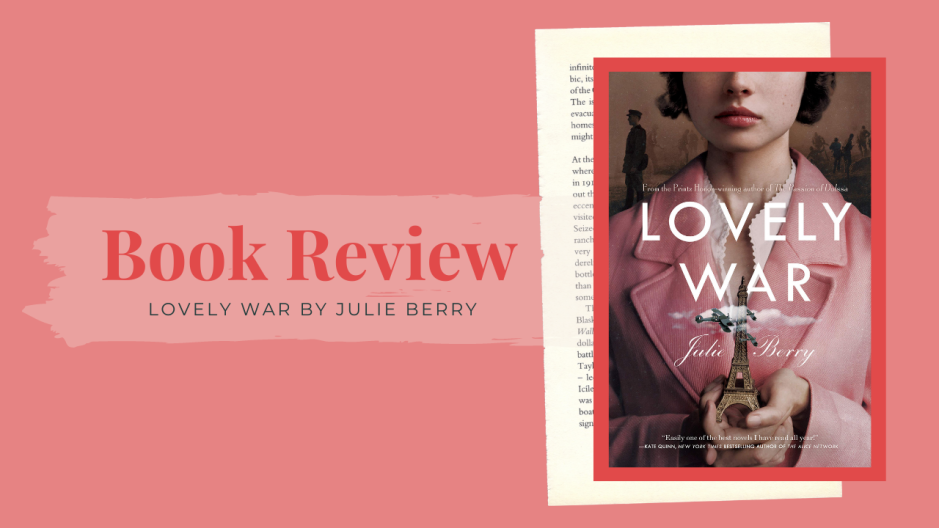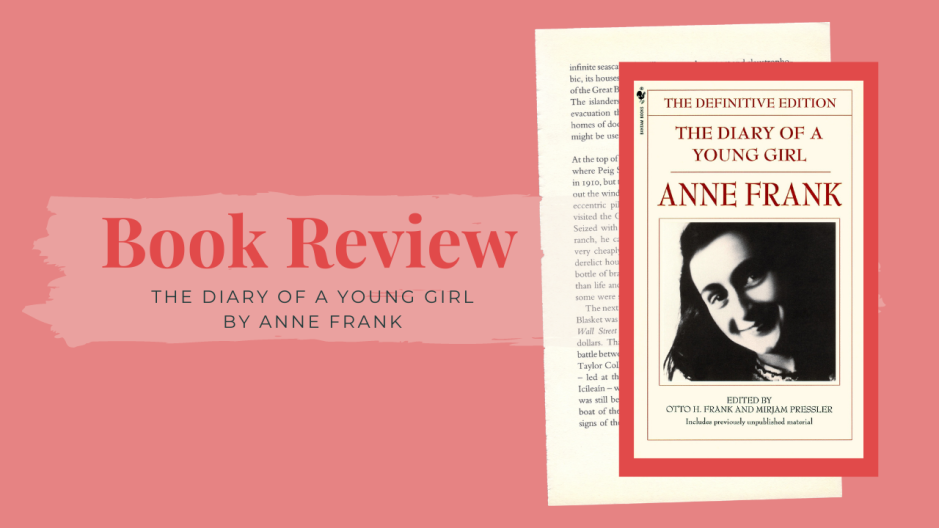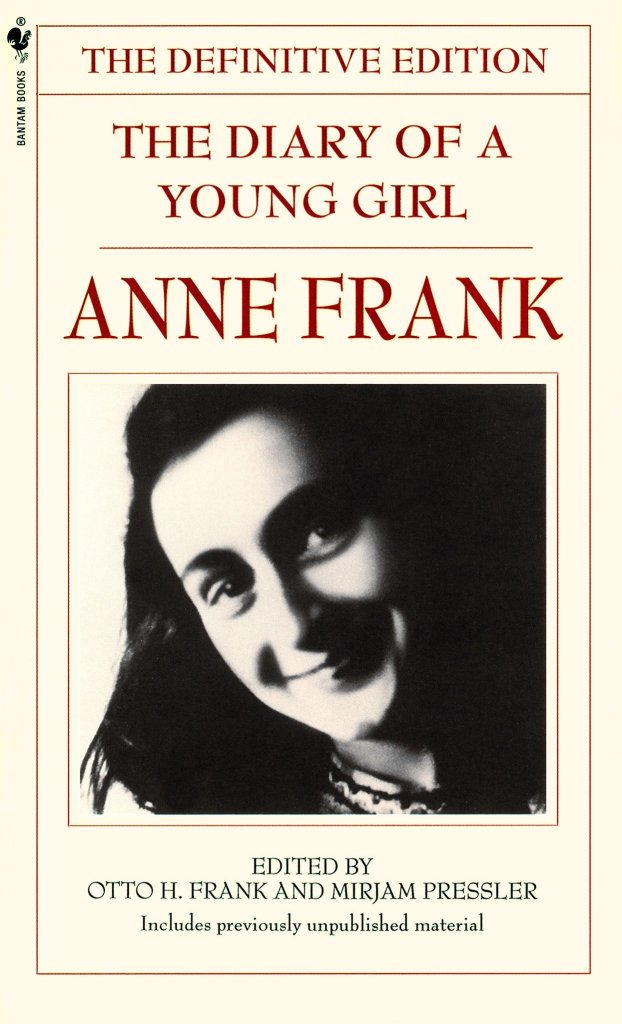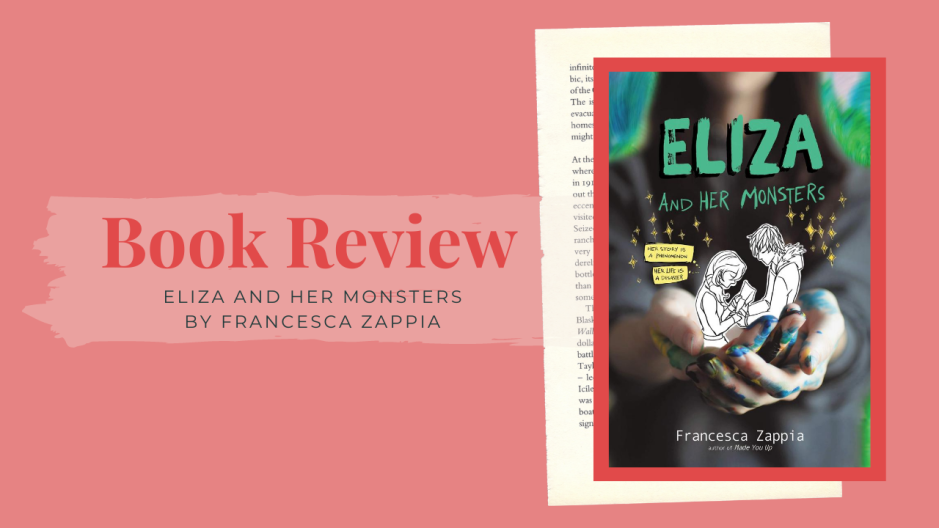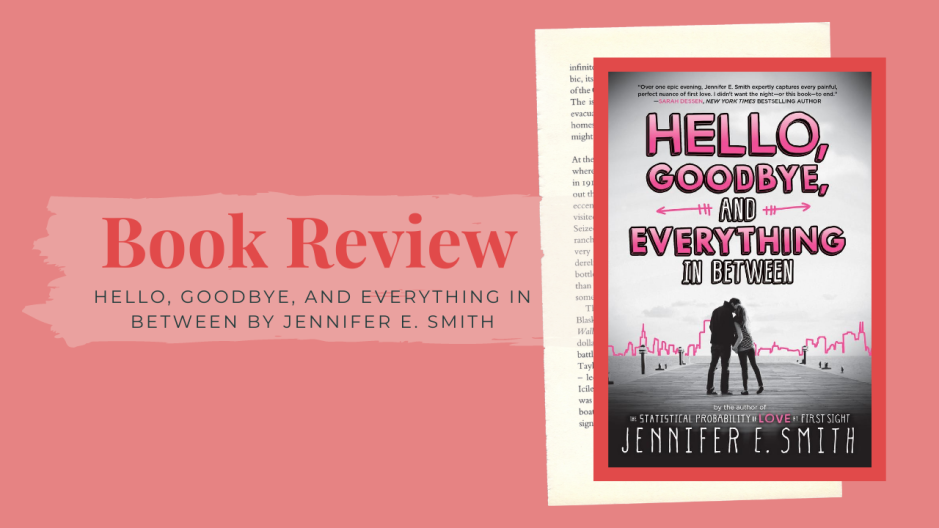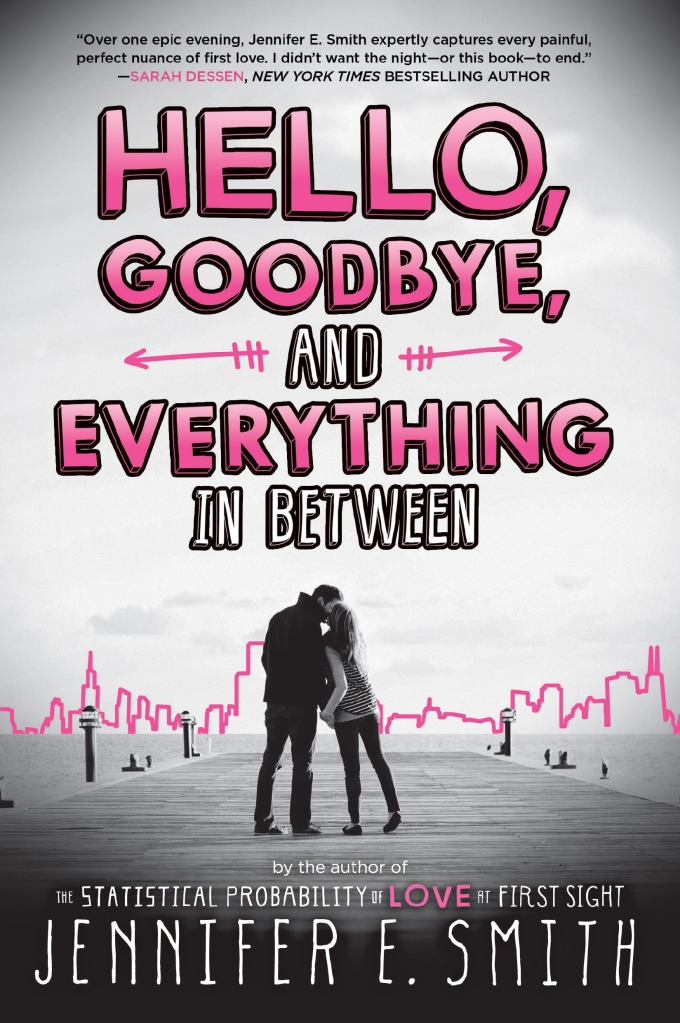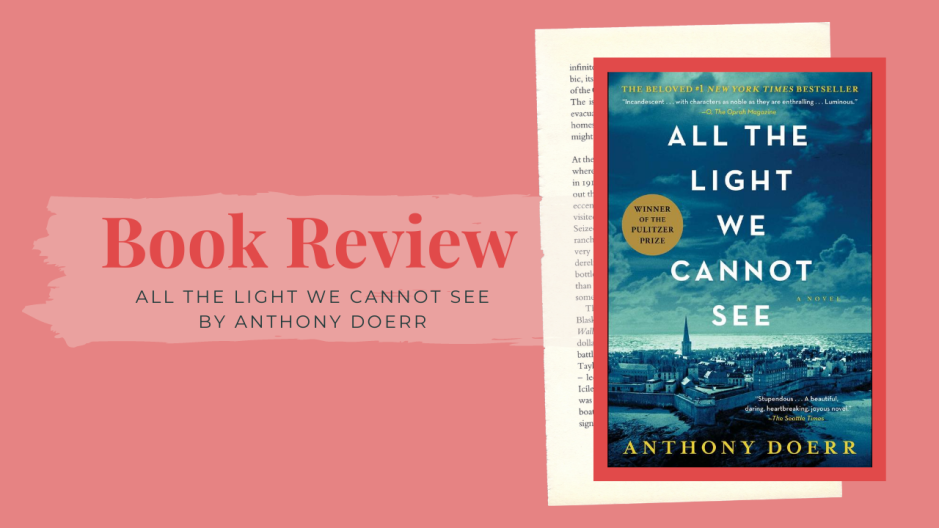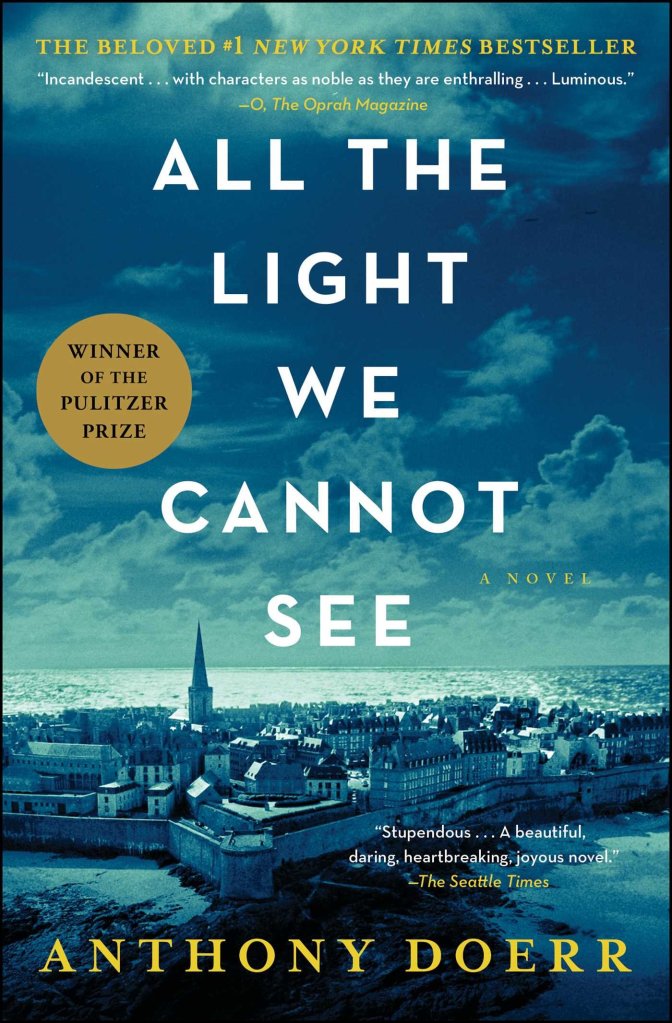I’m not a big fan of mythology. But Greek gods and goddesses telling two love stories set in the Great War? Feel free to sign me up!
I was quite hesitant, at first, to pick up Lovely War. In my reading goals post, I mentioned that I was curious how the author would handle the romance in this book. I was afraid that Julie Berry would romanticize war.
But I was pleased with how she managed to weave a multi-layered romance while staying true to the horrors of war. There were so many unspeakable things that happened in this historical fiction novel, but the romance part was really handled well.
Lovely War made me smile. It made me cry. It made me hope for a happy ending for the four young people who have seen and suffered so much. And if these feelings are not enough to show how much I love this book and highly recommend it, then keep reading to find out my full thoughts about this novel!
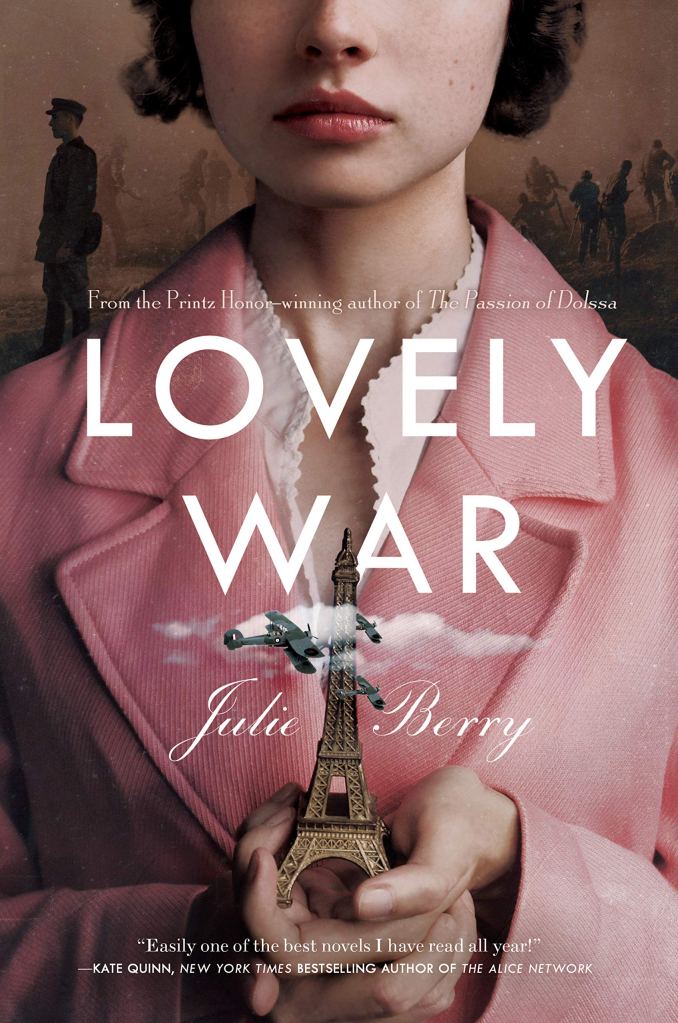
Book Title: Lovely War
Author: Julie Berry
Genre: Historical Fiction, Romance
Date Published: May 30th 2017 by Greenwillow Books
Rating: 4 stars
Content Warning: War, Murder, Hate Crime/Racism, PTSD
Synopsis
(From Goodreads) It’s 1917, and World War I is at its zenith when Hazel and James first catch sight of each other at a London party. She’s a shy and talented pianist; he’s a newly minted soldier with dreams of becoming an architect. When they fall in love, it’s immediate and deep–and cut short when James is shipped off to the killing fields.
Aubrey Edwards is also headed toward the trenches. A gifted musician who’s played Carnegie Hall, he’s a member of the 15th New York Infantry, an all-African-American regiment being sent to Europe to help end the Great War. Love is the last thing on his mind. But that’s before he meets Colette Fournier, a Belgian chanteuse who’s already survived unspeakable tragedy at the hands of the Germans.
Thirty years after these four lovers’ fates collide, the Greek goddess Aphrodite tells their stories to her husband, Hephaestus, and her lover, Ares, in a luxe Manhattan hotel room at the height of World War II. She seeks to answer the age-old question: Why are Love and War eternally drawn to one another? But her quest for a conclusion that will satisfy her jealous husband uncovers a multi-threaded tale of prejudice, trauma, and music and reveals that War is no match for the power of Love.
Book Review
Writing Style
Lovely War is written in multiple first-person POVs of Greek gods. But since they are merely telling the main story of two couples, the book is mostly in third-person POV.
I love the way Julie Berry wrote a story within a story. The subplot of the Greek gods were hilarious and witty. It’s clear which god is narrating the stories of the main characters because their voices are so distinct.
But Julie Berry’s excellent writing style stand out the most through the main plot of the two couples. I love the way she described the romantic feelings of the main characters in a unique way!
Everyone’s familiar with first loves (racing of hearts, butterflies in the stomach, secretive glances and longing stares). And I’ve read countless romance novels that describe the feeling of being in love with a person.
BUT!
There’s just something about Julie Berry’s description that sets this romance story apart from the rest. I absolutely love how she manages to capture the raw emotion of being in love. It made me connect to the characters, understand their yearning for their beloved, and sincerely hope for them to be happy.
Aside from effectively showing the romance between the characters, Julie Berry also managed to depict the horrors of war. The writing style is vivid and realistic. It was hard for me to read about the life in the trenches and the ever-present racism during that time.
Overall, Lovely War has a heart-wrenching and beautifully written prose that elevated my reading experience. My only critic is that the first-person writing can be distracting at times, so it took me more than a week to finish the book. This is mostly because of the framing of the story which I would discuss in detail below.
Plot
The idea of Greek gods narrating two love stories is a nice twist to an otherwise typical historical romance. In fact, that’s the main reason why I want to read Lovely War. It’s just unique!
However, as much as I love the idea, I’m not a big fan of the plot execution. I found the stories of the Greek gods to be distracting. Sure, I did enjoy their banter and their distinct narrative voices, but I just didn’t care for them!
I wanted to read more of the four lovely characters—Hazel and James, Colette and Aubrey. I wanted to read their stories without the Greek gods subplot. I know, it’s confusing. I love the idea, but I wish I got the two love stories alone instead.
Aside from the “distracting” subplot, I also didn’t like the slow pacing. And no, I’m not talking about a slow-burn romance because there’s none of that—it’s mostly insta-love and attraction (much to my slight desmay). I’m talking about the long pauses in between the romances.
I mean, sure, the tension of the war kept these couples from being together. I understand that and I absolutely enjoyed reading the yearning and the get-togethers. But it just took too long to get anywhere for my taste! I feel like if Lovely War was shorter, I would’ve loved the plot more.
Lastly, the last third of the book felt contrived in my opinion. I badly want the story to finish, but Julie Berry still have ideas to throw out which seemed so random. That’s all I’m going to say because I don’t want to spoil things for those who want to read this book.
With all that being said, I appreciated that Lovely War is historically accurate. Julie Berry certainly did her research before writing this novel. I learned about the treatment of women, the birth of Jazz music in Europe, the experiences of Black people during World War I, and so much more from the historical notes at the end! I also loved reading a glimpse of James Reese Europe’s life. I think it was a wise idea to feature real-life people in a fictional work.
Characters
The characters of this book are all so endearing in their own unique ways! And if you don’t already know, I’m a sucker for character-driven stories! So despite the slightly disappointing plot, I still loved reading Lovely War because of the characters.
Hazel and James. Oh, how my heart hurts so much for this couple! I wasn’t a big fan of this pairing in the beginning because their romance does develop quickly (insta-romance). But damn it, near the end of the book, I cared for them more than Colette and Aubrey!
By themselves, Hazel and James are a bit vanilla (ordinary and boring) compared to the complexity of the two other characters. However, when together, the romance between them is incredible and undeniable. I absolutely enjoyed reading their love for each other and even made me wish for a love as great as theirs. (LOL! Single and hopeless romantic alert!)
“If you think I can live without you, Miss Windicott,” James said, “you don’t know me at all.”
Colette and Aubrey. If Hazel and James hurt me, then Colette and Aubrey BROKE my heart. What lovely characters who have been through so much! I’m so glad that they found each other!
I love the way that music played a big part of their romance. I also enjoyed reading Aubrey, the self-proclaimed King of Ragtime, lose his confidence (even just a tiny bit) whenever he’s near Colette. I just LOVE everything about their relationship because it’s so complex just like their personalities.
“They’d found each other once, then found each other once more. Here she stood—not a jazz singer, not a glamorous Belgian, but a grieving girl who understood.”
And the friendship between Hazel, Colette, and Aubrey? As mademoiselle Colette would say, magnifique!
Of course, my book review of Lovely War wouldn’t be complete without discussing the Greek gods themselves. They’re so witty and hilarious which added lightness to the story.
I really enjoyed reading Aphrodite’s inner monologue whenever she does what she knows best. She wouldn’t let everything left to chance, especially when it comes to love. I also liked reading the perspective of Apollo and Hades!
“Let them start their dreadful wars, let destruction rain down, and let plague sweep through, but I will still be here, doing my work, holding humankind together with love like this.”
Overall Thoughts
If you’ve made it far into this review, then I’m pretty sure you have an idea of how much I enjoyed reading this book!
Lovely War is definitely one of the best Young Adult Historical Fiction novels out there! It will make you smile, laugh, hope, cry, and most importantly, learn many things about this time period. I highly recommend it to readers who like to read war stories and of course, romance!
Lastly, don’t forget to keep tissues nearby. Trust me, this book will hurt you. I won’t tell you if it’s the good kind or not. Figure it out yourself and read Lovely War asap!
Book Rating (Summary)
Writing Style: 4 stars
Plot: 3 stars
Characters: 5 stars
Overall Rating: 4 stars
My book review for Lovely War can also be found on Goodreads!
Let’s Talk!
Do you like reading historical fiction novels? Any lovely book recommendations?


